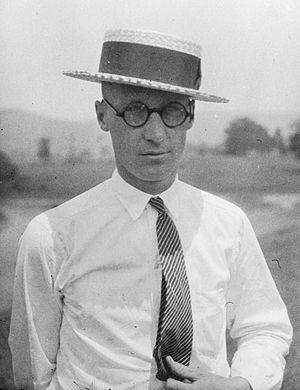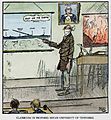Scopes trial facts for kids
The Scopes Trial, also known as the Scopes Monkey Trial, was a very famous court case in America in 1925. It happened in Dayton, Tennessee. A substitute high school teacher named John Scopes was accused of breaking a state law called the Butler Act. This law made it illegal to teach about human evolution in any school that received money from the state.
The trial was actually planned to get a lot of attention for the small town of Dayton. John Scopes wasn't even sure if he had taught evolution. But he agreed to be the defendant so the case could go to court.
Scopes was found guilty and had to pay a $100 fine. However, the decision was later overturned because of a small legal mistake. The trial successfully brought a lot of national attention. Reporters from all over the country came to Dayton. They wanted to see the famous lawyers who were arguing the case. William Jennings Bryan, who had run for president three times, argued for the prosecution (the side accusing Scopes). Clarence Darrow, a very well-known defense lawyer, spoke for John Scopes.
The trial also highlighted a big debate at the time called the Fundamentalist–Modernist Controversy. This was a disagreement between "Modernists" and "Fundamentalists." Modernists believed that evolution could fit with religious beliefs. Fundamentalists, on the other hand, believed that the words in the Bible were the most important truth, above all human knowledge. So, the trial was seen as both a religious debate and a question of whether modern evolutionary biology should be taught in schools.
The Tennessee law against teaching evolution was not removed until 1967.
Contents
What Was the Scopes Trial About?
The Scopes Trial was a legal case in 1925. It focused on a law in Tennessee called the Butler Act. This law said that teachers in state-funded schools could not teach that humans had evolved from other animals. It also said that teachers could not deny the Bible's story of creation.
Why Did the Trial Happen?
The trial was set up on purpose. Leaders in Dayton, Tennessee, wanted to bring attention and visitors to their town. They thought a big court case with famous lawyers would do just that. The American Civil Liberties Union (ACLU) offered to defend anyone who challenged the Butler Act. John Scopes, a young science teacher, agreed to be that person. He wasn't sure if he had actually taught evolution, but he knew it was in the textbook.
Key People in the Trial
Two very famous lawyers faced off in the Scopes Trial. Their involvement made the trial even more exciting and well-known across the country.
William Jennings Bryan: The Prosecutor
William Jennings Bryan was a well-known politician and speaker. He had run for president three times. In the Scopes Trial, he was part of the prosecution team. This meant he was arguing against John Scopes. Bryan was a strong believer in the literal truth of the Bible. He thought teaching evolution went against religious faith.
Clarence Darrow: The Defense Lawyer
Clarence Darrow was one of the most famous defense lawyers in America. He was known for defending people in important and often controversial cases. Darrow represented John Scopes. He believed that the law against teaching evolution was wrong. He argued for academic freedom and the right to teach scientific ideas in schools.
The Big Debate: Science vs. Religion
The Scopes Trial became a symbol of a larger conflict in America. This conflict was between new scientific ideas and traditional religious beliefs.
Modernists vs. Fundamentalists
- Modernists were people who believed that science and religion could exist together. They thought that evolution was a scientific fact but that it didn't necessarily go against religious faith.
- Fundamentalists were people who believed that the Bible was the literal word of God. They thought that the story of creation in the Bible was exactly how it happened. They saw evolution as a challenge to their faith.
The trial showed how deeply divided people were on these issues. It was not just about a teacher and a law. It was about how society would balance scientific discovery with religious traditions.
The Outcome and Impact
John Scopes was found guilty by the jury. He was ordered to pay a fine of $100. However, the Tennessee Supreme Court later overturned this decision. They did this on a technicality, meaning a small legal error. They did not rule on whether the Butler Act itself was right or wrong.
Even though the verdict was overturned, the trial achieved its goal of getting national attention. It brought the debate about teaching evolution into homes across America. It also showed the growing tension between traditional values and modern scientific thought in the 1920s. The Butler Act remained a law in Tennessee for many years, until it was finally repealed in 1967.
Images for kids
-
Clarence Darrow in 1925, during the trial
-
H. L. Mencken in 1928
-
William Jennings Bryan in 1925
-
Spencer Tracy (left) as Darrow surrogate Henry Drummond, and Fredric March (right) as Bryan surrogate Matthew Harrison Brady in the trailer for the film Inherit the Wind; Harry Morgan (in the background) plays the judge.
See also
 In Spanish: Juicio de Scopes para niños
In Spanish: Juicio de Scopes para niños
 | John T. Biggers |
 | Thomas Blackshear |
 | Mark Bradford |
 | Beverly Buchanan |









